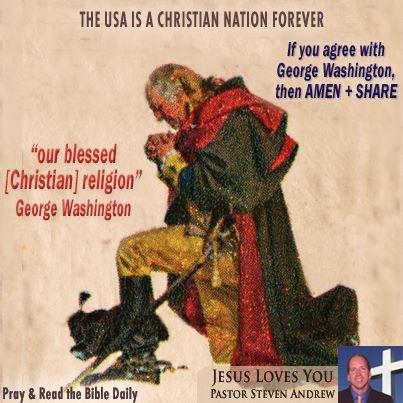In a recent poll, 57% of registered Republicans “support establishing Christianity as the national religion” and another 13% are not sure about it. Most such voters believe that the United States was, from its inception, a Christian nation, so formally establishing this “fact” seems a logical next step. But has the United States always been a Christian nation or was this idea manufactured and marketed by the industrial-business class? According to Princeton history professor Kevin Kruse, it’s the latter. In a recent NYT article which previews his forthcoming book, One Nation Under God: How Corporate America Invented Christian America, Kruse genealogizes this relatively recent idea:
Back in the 1930s, business leaders found themselves on the defensive. Their public prestige had plummeted with the Great Crash; their private businesses were under attack by Franklin D. Roosevelt’s New Deal from above and labor from below. To regain the upper hand, corporate leaders fought back on all fronts. They waged a figurative war in statehouses and, occasionally, a literal one in the streets; their campaigns extended from courts of law to the court of public opinion. But nothing worked particularly well until they began an inspired public relations offensive that cast capitalism as the handmaiden of Christianity.
The two had been described as soul mates before, but in this campaign they were wedded in pointed opposition to the “creeping socialism” of the New Deal…Accordingly, throughout the 1930s and ’40s, corporate leaders marketed a new ideology that combined elements of Christianity with an anti-federal libertarianism. Powerful business lobbies like the United States Chamber of Commerce and the National Association of Manufacturers led the way, promoting this ideology’s appeal in conferences and P.R. campaigns. Generous funding came from prominent businessmen, from household names like Harvey Firestone, Conrad Hilton, E. F. Hutton, Fred Maytag and Henry R. Luce to lesser-known leaders at U.S. Steel, General Motors and DuPont.
In a shrewd decision, these executives made clergymen their spokesmen. As Sun Oil’s J. Howard Pew noted, polls proved that ministers could mold public opinion more than any other profession. And so these businessmen worked to recruit clergy through private meetings and public appeals.
The most important clergyman for Christian libertarianism…was the Rev. Billy Graham. In his initial ministry, in the early 1950s, Mr. Graham supported corporate interests so zealously that a London paper called him “the Big Business evangelist.” The Garden of Eden, he informed revival attendees, was a paradise with “no union dues, no labor leaders, no snakes, no disease.” In the same spirit, he denounced all “government restrictions” in economic affairs, which he invariably attacked as “socialism.”
With Graham’s fervent support, Americans elected Dwight D. Eisenhower in a landslide and the national annointing commenced:
The first week of February 1953 set the dizzying pace: On Sunday morning, Eisenhower was baptized; that night, he broadcast an Oval Office address for the American Legion’s “Back to God” campaign; on Thursday, he appeared with [a corporate funded pastor] at the inaugural National Prayer Breakfast; on Friday, he instituted the first opening prayers at a cabinet meeting.
The rest of Washington consecrated itself, too. The Pentagon, State Department and other executive agencies quickly instituted prayer services of their own. In 1954, Congress added “under God” to the previously secular Pledge of Allegiance. It placed a similar slogan, “In God We Trust,” on postage that year and voted the following year to add it to paper money; in 1956, it became the nation’s official motto.
During these years, Americans were told, time and time again, not just that the country should be a Christian nation, but that it always had been one. They soon came to think of the United States as “one nation under God.” They’ve believed it ever since.
Though Kruse does not mention it, the geopolitical context for this christening was the Cold War, which was ideologically framed in the United States as a righteous battle against godless Communism. Like all great and enduring myths, the origins of this one were soon shrouded by the mists of time, or selective forgetting, and the Christian nation story took on a life of its own. Despite the end of the Cold War, the campaign continued and today it appears that ~76 million Americans would like to establish Christianity as the national religion.
A few years ago, I was having lunch with one of these many millions. He had just published a book on George Washington, the purpose of which was to prove that this revered founding father had always conceived the new nation as Christian and that the Jeffersonian separation of church and state was an egregious error. When I asked how he had approached the project, he stated he had hired research assistants to selectively search Washington’s entire corpus of writings for references to “God” and/or “Providence.” He then arranged these cullings in chronological order, without regard for context and with no examination of what Washington understood by “God” or how he conceived of “Providence,” as proof that Washington had originally framed the United States as a Christian nation. Rather than question these research methods, or lack thereof, I decided on a calming glass of wine.
This, however, is the sort of thing that continues to nourish the myth. While I doubt that Kruse’s book will persuade the believers, and am sure it will be savaged by the free-market Christian patriots on Fox, I’m looking forward to its release. Though Kruse’s focus is slightly different, his book may serve as a nice companion piece to Jeremy Carrette’s classic, Selling Spirituality: The Silent Takeover of Religion (2004).


